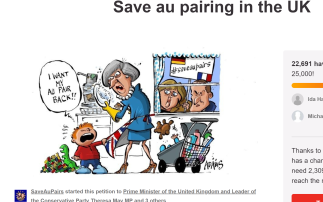
A recent UK campaign by au pair hosting families has called on the British government to guarantee that foreign youth will be able to continue to come, live and ‘work’ for short terms in the UK after Brexit as au pairs.[1] The campaigning hosting families, who significantly identify themselves on their website with the marketised term ‘the au pair industry,’ demand an uncapped visa category that would ‘benefit […] tens of thousands of working families who depend on an au pair for affordable childcare.’ With Brexit looming, they describe their fear from ‘a catastrophe for thousands of hard working families, as they [would? already?] struggle to adjust their work and living arrangements, and a hit on the productivity of UK plc’ (emphases added). It is normal and expected of campaigners to describe the safeguarding of their interests (in existing or alternative arrangements) as the common good, and as avoiding a catastrophe. However, what I like to draw attention to in the above wording is something that is far from unique to this campaign, but rather is a common illness in British public discourse, culminating in the phrase ‘working families’ and its sibling ‘hardworking families’).
The emphases I added above demonstrates a language that imagines, addresses, reproduces and explicates everyday life generally — and the au pairing institution in particular — through the capitalist worldview of life as labour, affordability and productivity. In such unchallanged live-to-work reality, a functioning society is first and foremost industrious and productive, and au pairs (and childcare generally) become a fundamental part of an endless everyday cycle of going to work, earning our keep, and spending our income on things that allow us to go to work again (like childcare, home or alcohol), in a never-ending purposeless cycle… Work, wash, repeat. Going to the gym, or any leisure activity, or even family time are merely there to make this reality more tolerable. Note how the term ‘UK PLC’ above implies limited agreement with this picture, as it doubles a mattered complaint about productivity targets pressure, but exactly not in order to mobilise a challenge to ‘the system,’ but to make it more tolerable, by gently warning the upper echelons of the risk of frustration in the working classes, and thus providing the management with an improvement-oriented feedback. So it is not about ending this mechanism, but about maintaining it.

Again, my analysis is not about au pairs, or the campaign for their future in the UK. These only instantiate the significance, prominence and meaning of the phrases ‘working families’ and ‘hardworking families’ in the UK. It attends to the tropes’ role, message and aim, and asks why is the ‘working’ or ‘hardworking’ called for? What does it do, that it is being preferred over merely ‘families’? Why is this phrase so prominent in current anglophone political discourse? Whom or what does it serve? And what happens every time we think through it, and use it?
First, we must foreclose the possibility that ‘working families’ implies families that ‘work’ well, so-to-speak, i.e. that function properly as oppose to ‘broken families.’ Rather, like ‘hardworking families,’ it is an expression that signifies families where both parents are in employment, and are not reliant on benefits, and are (therefore) forced to find childcare solutions within the pressing household finance and time constraints. Irrespective of my own first-hand appreciation of the immense time, finance and other resources that childrearing requires; as a trope, ‘working families’ serves a political agenda as it reproduces an idea about what families are supposed to do. Namely, work, and work hard. The harder the better. Indeed, ‘hard-working families’ is even more clear about propriety, as it doesn’t make do with work, but explicates diligence and effort.
Second, we need to understand what exactly is being signified here, what is that that we think of when these tropes are employed, and even more so, when they become a common keyword in public (political) discourse. I believe that when ‘working families’ are used, both utterers and recipients assume and make the (moral) claim that families with employed parents have, or should have, priority over other families. This clearly translates into British policies, such as in qualifying for discounts for nursery age childcare, and various other eligibilities and vocal concerns. This priority is based on the common fallacy that one’s rights depend on one’s duties, (and, as if working more for your family, or for your employer, means contributing more to the collective good).
But what is not explicated is whom is this priority over. Is it over employees with no children? Or over families who ‘live on benefits?’ Or over families where parents cannot work? Or are not allowed to work? Or cannot find employment? Or where there are no parents? Or where they do not work hard enough? You see, we don’t think about them directly, we focus on the explicated employed normative family, and probably think of ourselves, but because this qualifier is never explained, nor can it be explained in every momentary mentioning, all of these options are valid and are in operation whenever we think about ‘hardworking families.’
Moreover, with the strong normative middle-class-centred imagination that is concentrated into images like ‘hardworking family’ one will always have a doubt about whether one is part of the qualifying group, and is hardworking enough, (for example, whether or not a family where one parent is not in employment is at all struggling as much to be considered a working family, or whether part time work is hardworking enough), and so an effect of this terminology is that we all subconsciously strive to work more and harder. In other words, it functions as an autonomous sometimes-voluntary self-whip of employees, in disguise of appreciating their efforts.
However, childcare solutions are a good example for services that are in at least as much need by poorer families, many of whom do not have the extra bedroom for an au pair to begin with. Again, Jobseekers, or those whom are not allowed to work, or can’t find work, etc. – are not being thought of when we think through and reproduce these tropes.
Granted, what the campaigners were probably trying to convey is that childcare is acute to the ability of many families to go to work, and especially work for long hours, and especially for both parents to work, and this is the real cause for the common scenario where nobody is left to look after the children. When we describe ‘hardworking families’ families lose their joy, and are reduced to a burden on the workforce and the management, and are a problem that needs solutions. (thus the term ‘childcare solutions’). Instead – we do deserve affordable or even free childcare, but not because we work hard or harder, nor to allow us to work harder so that have no more time or energy for our loved ones.
Therefore, we must avoid both the moral higher ground that this trope forces, and from the political trap that shelters in it. Wouldn’t it just be better to describe the need for families to work less, or not as hard?
[1] Au pairs are typically 18-25 year old girls who come to a country as part of a mutual private temporary arrangement (usually for a few months) to learn language, experience a different culture and independence, live as a family member with a host family, and help with the kids. Au pairs are entitled for a room, full board and an allowance of about £80-100 per week, in return for 25 hours of childcare-related light tasks (which are sadly often an opening for abuse in the scope of works, hours and overall attitude). Au pairs are a welcomed cross-cultural institution, as long as we take parental responsibility for rights, wellbeing and positive experience of the visiting young adults, and don’t treat them like ‘downstairs people,’ or as a financial patch.
